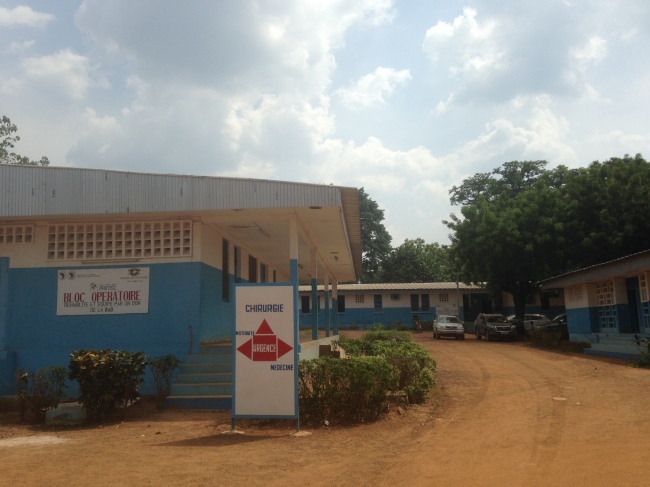SEGUELA/ABIDJAN, Ivory Coast ― Women chatter away in twos and threes as they lean over their bedsides at the neatly arranged patient rooms in a provincial hospital in Seguela, some 592 kilometers northwest of Abidjan.
Months before, most of the 25 patients entered the clinic feeling disgraced by their disease, obstetric fistula, and the resulting cold shoulder given by their family and community. Some were deserted by their husbands, and though the illness is treatable with a brief surgery, many hid it for years out of shame or due to a lack of money or knowledge.
Thanks to the support of the U.N. Population Fund and Korea International Cooperation Agency, they have received an operation and are now gearing up to start a fresh life.
 |
A general hospital is run by the Woroba provincial government in Seguela, Ivory Coast, where KOICA and the U.N. Population Fund provide treatment to obstetric fistula patients. (Shin Hyon-hee/The Korea Herald) |
“I contracted a fistula while giving birth at home 18 years ago. But I had no idea where else to get it treated than Abidjan because I needed to work,” said Bamba Djeneba, a 32-year-old woman from Worofla, a town in the same Woroba district.
“I endured enormous hardship especially after my husband left me and I had to return home. My clothes needed to be washed every day but the pain kept me from doing everything; I felt so sorry for my mom, who bore all the burden.”
Fistula is a symptom in which patients are incontinent of urine and feces due to a hole between the vagina and bladder, chiefly caused by prolonged intensive labor. Poor delivery conditions at home and their young age make the Ivorian women more vulnerable.
Primarily due to the stench, they grow more isolated and demonized in communities where people believe in sorcery, which often aggravates their mental health, said Kouame Bile, a UNFPA doctor who performed the surgery for Djeneba.
“The patients are nearly considered criminals and even their families try to conceal it. They get frightened to eat food because they would instantly excrete it,” he said. “They are alive but no different to the dead.”
KOICA, which opened an office in the West African country last August, joined forces with the multilateral agency in 2010, pledging $1.7 million until June this year. It plans to scale up its aid to more than $6 million between 2016 and 2018, according to Kim Sang-chul, representative of the Abidjan unit.
Launched in 2007, the project is aimed at reducing not only obstetric fistula but also the overall maternal mortality. In the poorer northwest region, only 9 percent of the population have access to basic emergency delivery services, and the cesarean section rate stands at a mere 1.5 percent of births.
“As Cote d’Ivoire (Ivory Coast) has set a goal of becoming an ‘emerging country’ by 2020, reinforcing human resources, education and public health is key,” Ivorian Prime Minister Daniel Kablan Duncan said in an interview with visiting Korean reporters in Abidjan.
“Women, in particular, play a very significant role in nurturing future generations and many women are benefiting from Korea’s support. I hope the two countries will strengthen cooperation in not only fistula but also breast cancer, where treatment is also in urgent need.”
KOICA and the FPA, in partnership with the Ivorian health ministry, provide treatment free of charge in eight regions across the country, targeting almost 1.4 million potential mothers and 700 fistula carriers. Altogether they have treated more than 780 people and expect the number to reach 1,200 by the end of this year.
Given the social bias, they are carrying out a “caravan” campaign in which they travel around the country every month to brief residents on their services, bring over fistula patients and raise awareness about the disease, family planning and sexual violence.
“They don’t come to us automatically; we should go look for them. We mobilize everything we can to spread our drive, including tribal and religious leaders, nongovernmental groups and former patients who are the best ambassadors,” Bile said.
“As we operate 13 caravans, people from Guinea and Burkina Faso heard about it and come to us.”
To help the women rebuild their lives, the organizations offer some funds after their recovery and train them in sewing, cooking or other useful skills at an academy.
Konan Monique Gifty, a 33-year-old mother of two daughters, opened a small clothing store in the vicinity of the clinic with the 85,000 CFA francs ($140) assistance following her surgery two years ago.
“It was so sad that I was this young but could not move freely and lost a lot of weight,” she said. “Now that I’ve recovered my health, I bought a bunch of garments and other materials to start this shop.”
By Shin Hyon-hee, Korea Herald correspondent (
heeshin@heraldcorp.com)








